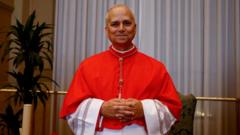Pope Leo XIV, a Chicago-born bishop, is positioned to influence Catholicism worldwide, representing a shift in leadership dynamics and challenges to conservative ideologies.
The Election of Pope Leo XIV: A Historic Moment for the Catholic Church

The Election of Pope Leo XIV: A Historic Moment for the Catholic Church
Robert Francis Prevost's election as the first American Pope brings significant implications for the global Catholic community.
Robert Francis Prevost has made history by becoming the 267th pope of the Roman Catholic Church, taking on the name Pope Leo XIV. His recent election, confirmed by the emergence of white smoke from the Sistine Chapel on May 8, 2025, marks him as the first American pontiff—a decision that challenges previous assumptions regarding the selection of popes from influential nations. This notable choice was made by 133 cardinals, who after two days of voting, decided to break with the tradition of avoiding candidates from global superpowers.
Born in Chicago and fluent in multiple languages, the 69-year-old Prevost has spent much of his career outside the U.S., particularly in Peru, where he held various ecclesiastical roles and eventually became a naturalized citizen. His background positions him as a unique candidate who could bridge cultural divides and address the diverse needs of the Church's global congregation. Having served under Pope Francis managing the important Vatican office responsible for the appointment and oversight of bishops, Prevost brings institutional knowledge that the Roman Curia values after experiencing turmoil throughout Francis' tenure.
Pope Leo XIV’s election is expected to bring transformative change within the church, especially as he operates against the backdrop of conservative movements in America. His leadership style may diverge significantly from what some factions of the Church have recently embraced, particularly highlighting his opposition to a more militarized and political Christian influence that gained traction during the Trump administration. As the Church navigates its future amidst evolving societal expectations, Leo XIV's international experience and progressive stance may signal a new chapter for Catholicism.























